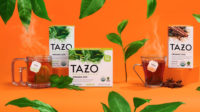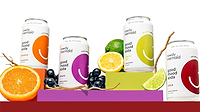Up Close With
Phocus combines hydration, energy
Beverage brand provides caffeine from tea

Image courtesy of PHOCUS
In an episode of NBC’s sitcom “Parks and Recreation,” the parks department considers a partnership with local candy company, Sweetums, which would allow concession stands in Pawnee parks to sell NutriYum energy bars. Initially, Leslie Knope, deputy director of the parks department, supports the idea. After learning from nurse and bestie Ann Perkins that the bars are extremely unhealthy and loaded with sugar, Knope works to stop the partnership, only for public vote in favor of the deal.
Conversely, in the real world, more consumers are finding favor for healthy food and drinks. To provide energy without added sugars, Phocus, a sparkling energy water, was created to bridge the gap between hydration and focused energy.
“Phocus was founded in October 2017 in Louisville, Ky.,” says John J Mittel, Phocus co-founder and head of corporate partnerships at Clear Cut Brands. “The product itself was born out of a personal need of the co-founders … who both wanted a drink that delivered hydration and energy, but without the added sugar and sweeteners of traditional energy drinks.”
Mittel explains that the energy drink category has, historically, been driven by category loyalists. Lately, though, he notes that newer brands have been able to accelerate the category’s growth by appealing to a younger, primarily female audience.
“As the millennial population ages, the desire for ‘better-for-you’ options continues to be an opportunity for growth,” Mittel says.
As for the sparkling water market, Mittel states that the category experienced a challenging 2022 due to supply chain challenges. However, the market has grown strongly this year with the alleviation of supply chain concerns, he adds.
Mittel observes that market share is being taken from larger brands by brands that “offer unique flavor and functional benefits.”
Brian Kristofek, senior vice president of marketing at Clear Cut Brands, points to functional trends as also impacting the sparkling water and energy drink market.
“More and more consumers are reaching for both foods and beverages with ingredients to provide specific health benefits — from boosting immunity to providing a spark of energy, customers are looking for more than just great flavor,” he says. “Specifically in the energy drink category, one of the highest attributes consumers seek in energy drinks is energy without the jitters. Phocus’ combination of clean caffeine from green tea, combined with L-theanine, provides a boost of energy without the jitters and mental clarity.”

Image courtesy of PHOCUS
Finding focus with Phocus
Compared with other energy drinks on the market, Mittel says that the taste, as well as the ingredients, are what make Phocus stand out.
“With 75 milligrams of caffeine, the same boost as a cup of coffee, Phocus lets you control the amount of caffeine you want,” he explains. “And without sugar or sweeteners, you can choose to drink multiple throughout the day.”
Kirstofek goes on to say that “timing is ideal” for a beverage that provides both energy and mental clarity, or to focus.
“Today’s consumers are living in a world of distraction,” he notes. “‘Always on’ social media, 10,000 marketing messages a day, rise in stress and anxiety, increased fatigue and lack of sleep, binge TV … it’s easy to lose clarity in the chaos. Phocus helps them break free from distraction and focus on what matters, whether it’s [their] career, craft, studies or wellness.”
Mittel explains that, when creating Phocus, the initial idea was for the product to be something to consume in place of the second coffee, energy drink or soda. Combining the energy drink and sparkling water categories was because the two categories were experiencing significant growth — “but their only innovation was caffeine content and flavor, respectively,” he says.
The top performer in the Phocus portfolio is the Blood Orange flavor. Other flavors include Watermelon, Crips Apple, Peach and Root Beer. Each beverage is made with purified sparkling water, citric acid natural flavor, natural tea caffeine, L-theanine and electrolytes.
Phocus has no sugar, no carbs, no calories and is vegan and gluten-free.
“Our most recent and successful flavor release has been Strawberry Kiwi,” Mittel says. “By following consumer preference and trends, we were able to create a flavor that has high affinity with consumers in both the sparkling water and energy drink categories, while exceeding our consumers’ expectations.”
Mittel explains that the brand is constantly following consumer trends in terms of flavors, pack sizes and product offerings. There are now 11 flavor offerings, including a Cola line. For now, he notes, Phocus is focused on driving the core flavors that consumers want, without over-extending the flavor offerings.
Growing the brand
Phocus’ distribution footprint is expanding into Target, broader Kroger territories, United Dairy Farmers and Giant Eagle, Mittel says. The brand also is accelerating placement in health and wellness chains in 2024, he notes.
“We’ve added over 20 non-alcoholic distributors across the Great Lakes region, as well as the South,” Mittel explains.
He says that the brand’s most successful marketing strategy has been getting the product in the hands of customers where they live, work and play.
“By employing this strategy, we’ve been able to show our customer the different occasions to drink Phocus, whether before or after a workout, as a replacement for the second coffee in the office, or by picking it up from the grocery store and using it any time you need a healthy boost of energy,” Mittel explains.
Mittel suspects that the future is bright for both the energy drink and sparking water market, especially because both categories are growing and attracting new consumers.
“We are seeing a significant subset of the consumers from both categories looking for exactly what Phocus offers,” he says. “Whether that’s the aging millennial demographic looking for a better-for-you option in the energy drink aisle or the sparkling water drinker wanting more function out of their sparkling water, Phocus fits both those needs.”
Looking for a reprint of this article?
From high-res PDFs to custom plaques, order your copy today!






